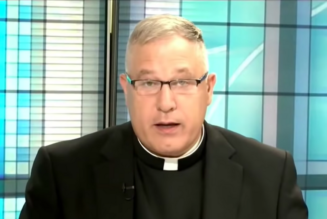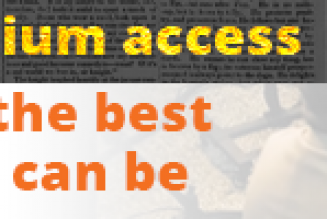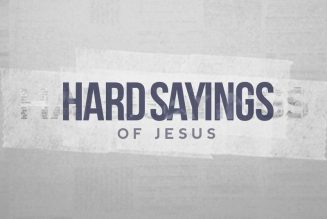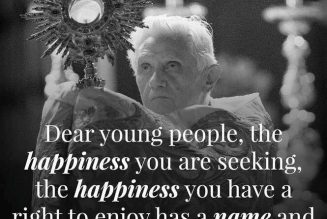 The hardest part of Lent is the consistency. It takes what the Desert Fathers, those famous old monks of the Egyptian desert starting around the third century, liked to call “discernment” or “discretion.” In a modern Catholic context, “discernment” often means determining whether God wants you to be a priest, a deacon, or a religious. Discretion means for us not spilling the beans: “Sure, you can tell John about your situation—he’s very discreet.” But for the monks, this word meant something more. They used the Greek word “diakresis,” which has the same root word as “crisis,” meaning a moment of decision.
The hardest part of Lent is the consistency. It takes what the Desert Fathers, those famous old monks of the Egyptian desert starting around the third century, liked to call “discernment” or “discretion.” In a modern Catholic context, “discernment” often means determining whether God wants you to be a priest, a deacon, or a religious. Discretion means for us not spilling the beans: “Sure, you can tell John about your situation—he’s very discreet.” But for the monks, this word meant something more. They used the Greek word “diakresis,” which has the same root word as “crisis,” meaning a moment of decision.
Discernment was that ability to understand what God’s will was in any situation, above all to judge one’s interior motives for any action. If truly Christian behavior is not just doing the right thing, but doing the right thing for the right reason, then discerning what is going on inside of our heads and hearts is an important part of our Christian discipleship. The monks were serious about what St. Paul calls in Romans 12:2 the “renewing of your mind.”
They were not advocating scrupulosity of the head or heart. Their own strategy was precisely not to think about how much progress they had made in the spiritual life, but to keep working and avoid presumption and despair. Even on their deathbeds they rejected judging themselves. How were they to know how they stood in God’s eyes? They threw themselves on Christ’s mercy as we all should.
They understood that exteriorly good acts without the intention to obey God gain us no praise. They knew good actions without the necessary foundation of prayer behind and under those actions often do us no good. Though they fled ordinary society and lived in a way that was not just strange but often repugnant to others, people flocked to the desert to get answers for themselves and to enlist their help. The Desert Fathers understood that the best response to such requests was sometimes “No.” They knew that they could become idols both to others and to themselves.
These strange men speak to me. I often deal with a busy schedule by… adding to it. Many activities are good, but how often do I ask God, “Should I say Yes or No?” The monks were instructed to stay in their cells and pray. It was their spirit that St. Benedict had when he wrote in his rule, “Let nothing be preferred to the work of God.” Praying, especially the Divine Office, is always priority one.
I’m not bound to pray the Divine Office, but the Lord commands me to “pray without ceasing” (I Thessalonians 5:17). Prayer is priority one for suburban dads as well as monks. How often do I say no to yet another activity to spend more time in prayer? How often do I take up tasks without a proper foundation of prayer for my activity?
Discernment is something more than pros and cons on a sheet of paper. It is putting my life before God and letting him direct my paths and my actions. How often do I lay bare my mind before God so that I myself can see why I want or feel pressured to do something?
As a writer, I sympathize with the essayist Joseph Epstein’s observation that he almost never turned down a job because he was afraid nobody would ever ask him again. Many of my decisions have such thoughts and fears as their base. When we act out of fear for our future, we often close our hearts to God here and now.
Discernment of thoughts is a matter of being aware of and fighting against tempting trains of thought that lead us away from the present moment, into irrational fears for the future, and from there into foolish and sinful decisions that make us not want to pray.
We need what they called “custody of the heart.” Examination of conscience in the evening is important, but to the Fathers what is required is constant vigilance about one’s thoughts. “The work of the monk,” says one, is to see “thoughts coming from afar.” We often begin a bad train of thought and either pretend we are not thinking it or rationalize embracing it. We have to ask each thought as we see it coming: “Are you of the enemy or of us?”
How did the monks stay on guard? The answer is very simple and very hard: they actually tried to pray without ceasing. They understood that banishing an evil train of thought was not enough. You have to fill your mind with good. The monks prayed all 150 Psalms each day. Unless they were really remote hermits, they attended the liturgy on Sundays and feast days. They fixed their minds on Scripture texts, often repeating a single verse throughout the day.
The most famous line they tended to repeat was actually derived from three passages: the so-called “Christ Hymn” of Philippians 2:6-11, the Annunciation in Luke 1:31-35, and the story of the Pharisee and the Publican. It’s the “Jesus Prayer”: “Lord Jesus Christ, son of God, have mercy upon me, a sinner.”
The thoughts that appear in my mind are too seldom words of Scripture or prayers of the Tradition. A friend says he can’t remember the things he wants to but can remember the lyrics to ancient pop songs. Me too. The Fathers of the Desert went out in the desert to escape the pop songs. We who aren’t monks don’t need to (and perhaps shouldn’t) abandon all knowledge of our culture. But we must learn to guard our hearts. We need to listen attentively to the words of the Scriptures and the prayers of the faith such that they are the music that dominates our inner ear and makes our hearts beat consistently to the name above all names.
Republished with gracious permission from The Catholic Servant.
The Imaginative Conservative applies the principle of appreciation to the discussion of culture and politics—we approach dialogue with magnanimity rather than with mere civility. Will you help us remain a refreshing oasis in the increasingly contentious arena of modern discourse? Please consider donating now.
The featured image is “Teaching scene of Desert Fathers. Armenian manuscript by the monk Tadeos Awramenc, Kaffa (1430) and is in the public domain, courtesy of Wikimedia Commons.










